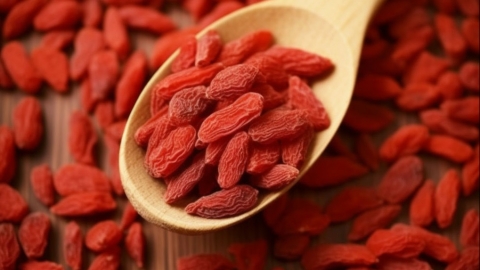What are the health benefits of drinking water infused with Ophiopogon japonicus (mai dong) and Lycium barbarum (goji berries)?
Generally speaking, combining Ophiopogon japonicus (Mai Men Dong) and Lycium barbarum (Gou Qi Zi) to brew as tea is a common combination of medicinal and dietary use. This combination offers various benefits, including nourishing yin and promoting body fluid production, nourishing the liver and kidneys, moistening the lungs and relieving cough, enriching essence and improving vision, and alleviating fatigue. Detailed explanations are as follows:

1. Nourishing Yin and Promoting Body Fluid Production: Ophiopogon japonicus has a sweet and slightly bitter taste and is slightly cold in nature, effectively nourishing yin and replenishing body fluids; Lycium barbarum has a sweet and neutral nature and can assist in nourishing the body. When used together in tea, this combination is suitable for relieving symptoms such as dry mouth and throat, sore throat, and hoarseness caused by dry weather, staying up late, or deficiency of body fluids.
2. Nourishing the Liver and Kidneys: Lycium barbarum is particularly effective in nourishing the yin of the liver and kidneys, while Ophiopogon japonicus nourishes yin and moistens dryness. Together, their nourishing effects are enhanced. This combination is suitable for alleviating symptoms caused by deficiency of the liver and kidneys, such as soreness and weakness of the waist and knees, dizziness and tinnitus, and dry hair, helping regulate liver and kidney function and improving physical weakness caused by deficiency of the liver and kidneys.
3. Moistening the Lungs and Relieving Cough: Ophiopogon japonicus can moisten the lungs and relieve dryness, effectively alleviating discomfort caused by lung dryness; Lycium barbarum assists in nourishing the body. For symptoms such as dry cough with little phlegm, scanty and sticky phlegm, and prolonged cough caused by lung dryness, drinking this tea can moisturize the lungs, reduce dryness, and alleviate cough symptoms.
4. Enriching Essence and Improving Vision: Lycium barbarum helps improve vision and relieve eye discomfort; Ophiopogon japonicus nourishes yin to reduce eye dryness. This combination is suitable for symptoms such as dry eyes, blurred vision, and visual fatigue caused by excessive use of the eyes over a long period or yin deficiency of the liver and kidneys, helping protect vision and relieve eye fatigue.
5. Alleviating Fatigue: Ophiopogon japonicus nourishes yin and promotes body fluid production, while Lycium barbarum provides nourishment. Together, they supply nutrients to the body. This combination is suitable for fatigue-related conditions caused by qi deficiency and yin deficiency, such as low spirits, limb weakness, shortness of breath, and lethargy, providing support to the body, helping restore energy, and reducing fatigue.
It is also important to be aware of contraindications and precautions when using this combination. For example, individuals with spleen and stomach deficiency-cold or those prone to diarrhea should consume it in moderation to avoid excessive intake that may cause discomfort. It is recommended to strictly follow medical advice or consume it appropriately according to individual conditions to ensure safety and effectiveness.




